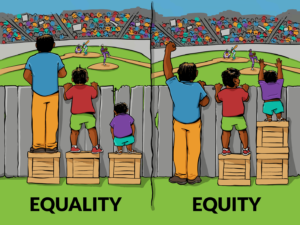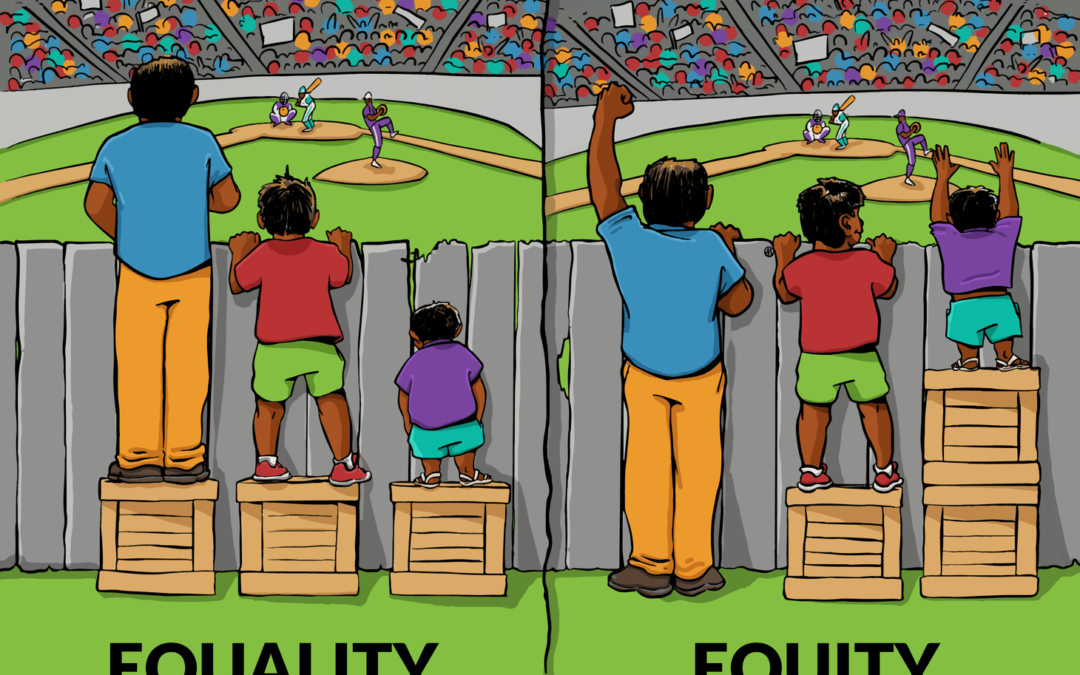
Accommodations Boost Reading Confidence
“Interaction Institute for Social Change | Artist: Angus Maguire.” Interactioninstitute.org and madewithangus.com
If your child struggles with reading, they probably struggle with learning on a daily basis, and this takes a toll. This constant struggle with academics from a young age leaves a lasting impression on their self-esteem (feelings of self-worth and value). Helping your child feel successful, despite their reading struggles, will boost your child’s reading confidence, and will support life-long healthy self-esteem.
We all want to be recognized for doing something well. A pat on the back, a heart-felt thanks, some kind of recognition that we have value. Children who struggle with reading hear more about things they don’t get right, than what they do get right. Struggling readers often have poor handwriting, and terrible spelling as well. What makes it even more difficult is that other children seem to pick up reading with very little effort, soaking it up like a sponge. These 9 tips will help you boost your child’s reading confidence, and will help them be more successful throughout their life.
-
Realize that your child’s reading struggles are NOT your fault.
Parents often think they should have read more with their children to improve their reading. This simply isn’t true for some children. The sooner you recognize that you did not cause your child’s reading difficulties, the sooner you can start helping them.
Reading comes naturally for many children. Most children begin to make sense of letter patterns, and their corresponding sounds from an early age. Rhyming is easy, simple signs make sense, sometimes children are even beginning to read before starting Kindergarten. However, at least 1 in 5 children need more structured reading instruction. In fact, some children cannot differentiate the different sound patterns, and will need specialized instruction, before they can even begin learning to read.
-
Seek professional help.
Testing can identify students who are at-risk readers as young as 5.5 years old (with 92% accuracy). But that is only part of the story. If your student is found to be at-risk, they need specialized Orton-Gillingham based reading instruction, instead of the traditional classroom instruction.
-
Remove barriers to learning with classroom accommodations.
Many people struggle with the idea of accommodations. They think a child is being given an advantage in learning. Are glasses for a child who has poor vision an advantage? Or a box, for a short child to stand on, so they can see over the fence? These are not advantages, they help a child do what all the other children can do easily. Classroom accommodations merely provide a student with the tools they need to become a successful student in the classroom.
-
Feed their “reading” and learning appetite with audio books.
Make reading and learning as easy as possible. Audio books are available through your local library, YouTube, through subscriptions to services like Learning Ally or Audible, or if your child has a documented reading disability – they may qualify for a free subscription to Bookshare through their public school.
-
Reinforce their love of listening.
Allow your child to listen to audio books when “reading” for pleasure. Listening to books encourages your child’s imagination, as if they were reading. It helps them build vocabulary, reinforces good language structure, and enhances their ability to comprehend the spoken word. Learning to listen well also has other merits, which may aid them as they get older.
-
Boost reading confidence; Find books at their reading level, not grade level.
Find books with words/sounds your child has already learned, and reinforce these patterns and sounds until they are mastered.
-
Read the difficult words to your child, and move on.
Children that struggle with reading, or have a reading disability such as dyslexia, need to see and hear a word pronounced correctly many times before it becomes part of their working memory. Expecting them to sound out difficult words frustrates them, hampers their comprehension and does not help with long term memory storage.
-
Read together.
Reading should be a fun, relaxing activity to do together. Teach your child that reading is a fun choice, even when there are other options for entertainment. This will instill the idea that reading can be pleasurable, and associates reading as a special time with you!
-
Support your child’s strengths.
Children who struggle with reading need to be reminded that reading is only ONE part of their life. Encourage your child to try new things, this may include sports, visual or performing arts, or other creative endeavors. There is more to life than reading and academics, help your child find their strengths and support their success.
There are many reasons a child may not learn to read as quickly as their peers. If your child seems bright and curious, dyslexia may be the cause (see the Warning Signs). This is an inherited learning disability. It is caused by a neurological difference in the brain. With early identification and testing, and appropriate reading remediation, your child can close the learning gap. While reading is certainly important, remember, it is only one part of raising a confident child, with good self-esteem who is prepared to face the world.
Kristin Clark is a contributing author to Reading Success Plus, and is a member of Decoding Dyslexia – Michigan. Kristin is the parent of a high schooler who is dyslexic. Please contact us or subscribe to learn more at: www.readingsuccessplus.com.
© Reading Success Plus
